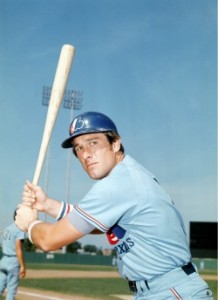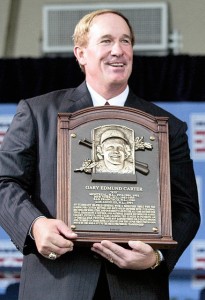Gary Carter Helped Make the Montreal Expos Into a Winner
It was sad news out of the baseball world this week with the passing of Hall of Fame catcher Gary Carter at the age of 57 following a battle with cancer. While many best identify Carter with helping the New York Mets win the 1986 World Series, it was during his initial 11 years as a member of the Montreal Expos that Carter became one of the elite catchers of his era.
Selected by the Expos in the third round of the 1972 amateur draft, it took Carter just two years before he made his Major League debut as a September call-up in 1974.
Carter hit .407 with a home run and six RBI during nine games in 1974 and the next season finished second in the National League Rookie of the Year voting and made his first All-Star appearance while hitting .270 with 17 home runs and 68 RBI. Though he struggled the next year with a .219 average, by 1977 it was obvious that he would be one of the key lynch-pins of future success for the Expos.
In 1978 Carter blasted 31 home runs and drove home 84 runs while hitting .284. Two years later, Carter began a string of 10 straight All-Star appearances as the Expos posted the first winning season in team history while winning what still remains a franchise record 95 games. Unfortunately, in an era before the wild card, the Expos were unable to earn a postseason bid as they finished two games behind the Pittsburgh Pirates.
Carter finished second in the National League MVP race in 1980 as he hit 29 home runs with 101 RBI. The Expos nearly won the NL East, but dropped two of three games to the Philadelphia Phillies on the final weekend of the season.
It was during the 1981 All-Star Game that Carter became a household name. Played a month later than normal due to the baseball player’s strike, Carter led the National League to victory with a two-run home run in the seventh inning to earn MVP honors.
The Expos finished with the best record in the NL East during the second half of the season and earned their first playoff trip. After defeating the Phillies in the Division Playoffs Round, the Expos took the eventual World Series Champion Los Angeles Dodgers to a decisive fifth game, but lost the final game 2-1 on a ninth inning home run by Rick Monday.
Montreal posted winning records in 1982 and 1983, but fell to 78-83 in 1984. Carter had his best all-around offensive season in 1984 as he hit .294 with 27 home runs and a career-high 106 RBI.
Following the 1984 season, Carter was traded to the New York Mets for a group of players that included Hubie Brooks and Herm Winningham.
The Mets in the mid-1980s were developing a roster that craftily included a mix of talented, home-grown young players and seasoned veterans.
Carter proved to be a key final ingredient that helped the Mets become a championship squad. He hit a career-high 32 home runs and drove home 100 runs as the Mets narrowly lost the NL East to the St. Louis Cardinals in 1985.
The following season, Carter drove home a 105 runs and the Mets posted 108 victories and won the NL East by 21.5 games.
After edging the Houston Astros in the NL Championship Series, the Mets faced the Boston Red Sox in the 1986 World Series. It appeared that they were going to fall just short of a title as they trailed by two runs in the tenth inning of the sixth game with the Red Sox holding a 3-2 series lead.
The Mets were down to their final out when Carter kept their seemingly minimal hope alive with a single. Of course what happened next has become part of baseball lore as the Mets rallied to win game six and then defeated the Red Sox 8-5 in the seventh game. Carter hit .276 in the series with two home runs and nine RBI.
Many expected the Mets to continue their domination for years to come, but they proved to be the dynasty that never was and reached the playoffs just once more (1988) without winning another title.
The 1986 season proved to be the high-point for Carter as he was the regular catcher for the Mets for only two more years. His final year with the Mets was in 1989 when he played in just 50 games and hit .183 with two home runs and 15 RBI.
He finished his career with single seasons with the Giants, Dodgers and then back with the Expos for the 1992 campaign.
For his career, Carter hit .262 with 324 home runs and 1,225 RBI. He also had 2,092 hits, scored 1,025 runs and had 371 doubles.
Despite being a three-time Gold Glove, five-time Silver Slugger winner and 11-time All-Star, it took six tries before Carter was finally selected to the Baseball Hall of Fame in 2003.
In May 2011, Carter was diagnosed with brain cancer and valiantly battled his disease before passing away on Thursday.
He will always be remembered as one of the greatest players in the history of the Montreal Expos as well as one of the top catchers in baseball history.


Thank you for the auspicious writeup. It in fact was a entertainment account it. Look advanced to more introduced agreeable from you! However, how could we keep up a correspondence?
This site is really a walk-by for the entire data you wanted about this and didn’t know who to ask. Glimpse right here, and you’ll positively discover it.
It’s a pity you don’t have a donate button! I’d definitely donate to this brilliant blog! I guess for now i’ll settle for bookmarking and adding your RSS feed to my Google account. I look forward to new updates and will talk about this website with my Facebook group. Talk soon!
Its like you read my mind! You seem to know a lot approximately this, like you wrote the guide in it or something. I think that you simply can do with a few % to drive the message home a little bit, however other than that, that is wonderful blog. A fantastic read. I’ll certainly be back.
Good day very cool web site!! Man .. Excellent .. Amazing .. I will bookmark your blog and take the feeds also?I’m glad to seek out so many helpful info right here within the publish, we want work out more techniques on this regard, thank you for sharing. . . . . .
After research a number of of the weblog posts in your website now, and I actually like your method of blogging. I bookmarked it to my bookmark web site list and might be checking back soon. Pls try my site as properly and let me know what you think.
Great goods from you, man. I have understand your stuff previous to and you’re just extremely fantastic. I actually like what you have acquired here, certainly like what you are saying and the way in which you say it. You make it enjoyable and you still take care of to keep it smart. I can not wait to read much more from you. This is actually a terrific website.
I wanted to thank you for this particular great read!! I definitely enjoying every little bit of it I have you bookmarked to check out new stuff you article
Dead written subject matter, Really enjoyed reading through .
Hey there, fellow, im totaly agree with you!
Great post. I was checking constantly this blog and I am impressed! Extremely useful info specifically the last part 🙂 I care for such info a lot. I was looking for this particular information for a long time. Thank you and good luck.